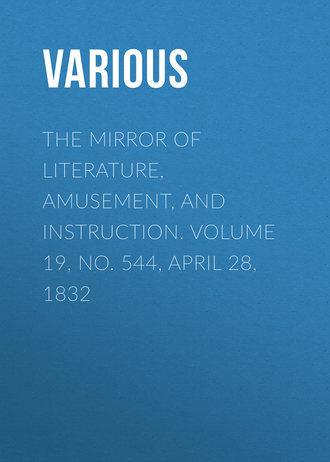 полная версия
полная версияThe Mirror of Literature, Amusement, and Instruction. Volume 19, No. 544, April 28, 1832

Various
The Mirror of Literature, Amusement, and Instruction / Volume 19, No. 544, April 28, 1832
SWISS COTTAGE, AT THE COLOSSEUM, IN THE REGENT'S PARK
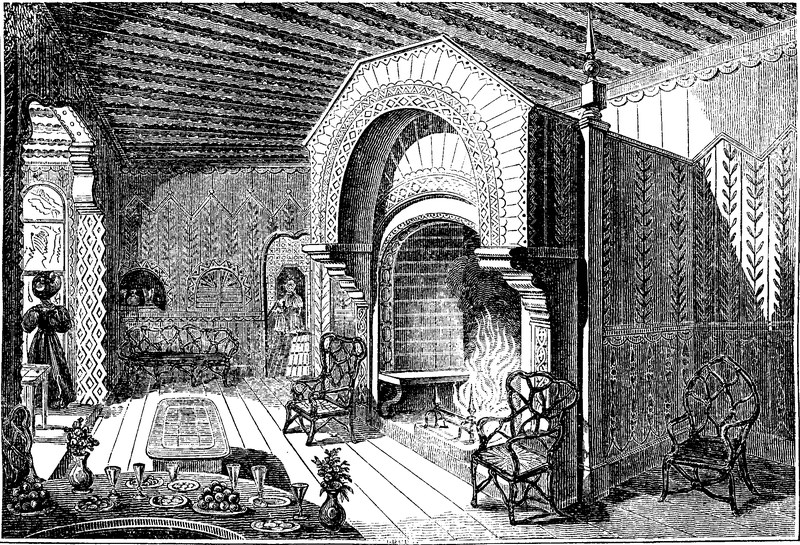
Swiss Cottage, At The Colosseum
It is now upwards of three years since we directed the attention of our readers to the wonders of this little world of art.1 The ingenious projector, Mr. Horner, was then polite enough to conduct us throughout the buildings and grounds, and to explain to us the original design of the unfinished works as well as of many contemplated additions. This was about three weeks before the Exhibition was opened to the public. The Panorama was then partly in outline, and we had to catch its identities through a maze of scaffolding poles, planks, and stages; while the immense domed area re-echoed with the operations of scores of artistes of every grade, from the upholsterer nailing up gay draperies, to the heavy blow of the carpenter's mallet. We took advantage of our privileged visit, to point out to the reader how much he might expect from a visit to the Panorama, and, in our subsequent visits we have not for a moment regretted the particular attention we were induced to bestow upon this unrivalled work of art. It is justly described to be "such a Pictoral History of London—such a faithful display of its myriads of public and private buildings—such an impression of the vastness, wealth, business, pleasure, commerce, and luxury of the English metropolis, as nothing else can effect. Histories, descriptions, maps, and prints, are all imperfect and defective, when compared to this immense Panorama—they are scraps and mere touches of the pen and pencil—whilst this imparts, at a glance, at one view, a cyclopædia of information—a concentrated history—a focal topography, of the largest and most influential city in the world. The immense area of surface which this picture occupies will surprise the reader: it measures 40,000 square feet, or nearly an acre in extent."2 This may be a glowing eulogium; but it is true to the line and letter.
We have already illustrated the Panorama,3 and it is our intention to introduce other embellishments of the Colosseum, as far as may be compatible with finished sketches. Our present subject is the principal apartment in the Swiss Cottage, to which the reader or visiter is conducted through a range of conservatories, containing choice exotics, with some of the most majestic proportions of leaf and flower that can be enjoyed in any clime. The communication is by a stone-work passage, the temperature of which is a refreshing succedaneum to that of the conservatories, or 72°. This cottage was designed by P.F. Robinson, Esq. who has evinced considerable taste in a publication on cottages and cottage-villas, as well as in the execution of various buildings. It consists of four apartments, three of which may be considered as finished. The apartment in our Engraving was completed, or nearly so, on our first visit. It is wainscotted with coloured (knotted) wood, and carved in imitation of the ornamented dwelling of a Swiss family. The fire-place will be recognised as the very beau ideal of cottage comfort: the raised hearthstone, massive fire-dogs and chimney-back, and its cosy seats, calculated to contain a whole family seated at the sides of its ample hearth–are characteristic of the primitive enjoyments of the happy people from among whom this model was taken. Our view is from the extreme corner, from which point the entrance-passage is shown in the distance.
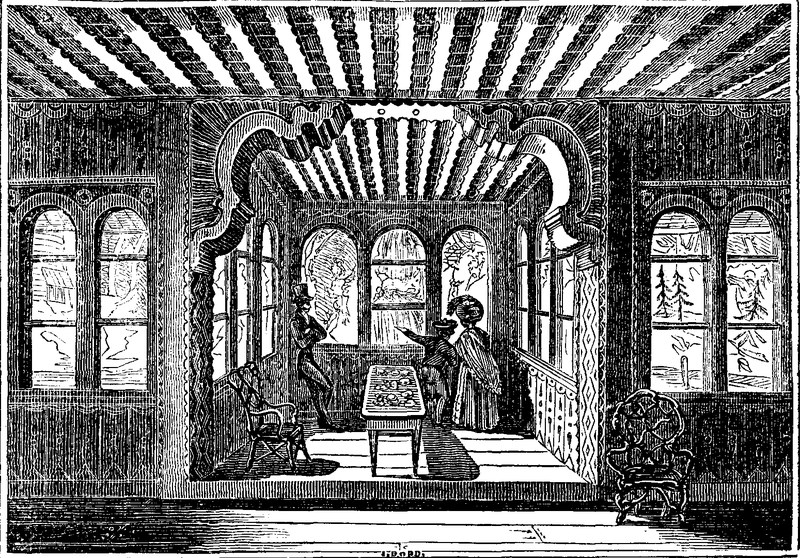
Apartment Interior
The second Engraving shows the recessed window of the apartment, which faces the fire-place, and commands a view of a mass of rock-scenery, ornamented with waterfalls of singular contrivance and effect. The frames are filled in with plate-glass, so that the view of these artificial wonders is unobstructed. Our artist has, in his sketch, endeavoured to convey some idea of their outline; but he hopes to supply an amplification of their scenic beauty in a future engraving. We may, however, observe that the view from this window deserves the character of the sublime in miniature, and presents even a microcosm, where
Rocks and forests, lakes, and mountains grand,Mark the true majesty of Nature's hand.The whole apartment presents a finished specimen of joinery, with a tasteful display of ornamental carving. Its colour is a deep warm or, we think, burnt sienna, brown; the furniture is in recherché rusticated style, planned by Mr. Gray, whose taste in these matters is elaborately correct; and it requires but the social blaze on the hearth, (which our artist has liberally supplied,) to complete the well-devised illusion of the scene. The apartment was painted about two years since as a scene for a musical piece at Covent Garden Theatre, the incidents of which lay in Switzerland.
THE VOICES OF THE NIGHT
BY MISS M.L. BEEVOR(For the Mirror.)Like some young veiled Bride,Gleams the moon's hazy face,When tissues that would hideBut lend her charms a grace:Each winkling starlet pale,Sleeps in its far, far fold,Wrapp'd in the heavy veilOf dewy clouds and cold.The turmoil, din, and strife,Of factious earth are o'er;The turbid waves of lifeHave ceas'd to roll and roar;But tones now meet the ear,Full fraught with strange delight,And intermingling fear:The Voices of the Night!Not such as softly riseWhen boughs with song o'erflow,And lover's vows and sighs,Like incense breathe below;Not such as warm his breast,Whose fever'd anxious brainToils when all else hath rest,To bring the lost again!But the owl's boding shriek,The death-cry of his prey;The tongues that durst not speakIn bright unslumb'ring day;The murd'rer's curses fell,His quiv'ring victim's groan;The mutt'red, moody spellWhich rocks ABADDON'S throne!The song of winds that sweepImpetuously aroundOur rolling sphere, and keepUp conferences profound;The music of the sea,When battling waves run mad;Far sweeter there may be,But none so wild and sad.The wail of forests vastThro' which pour storms like light,Whilst rending in the blast,They feebly own its might!Deep thund'rings o'er the main:The short shrill smother'd cry,Hurl'd to the skies in vain,Of drowning agony!The SOMETHING toneless, whichSpeaks awfully to men,Startling the poor and rich,For CONSCIENCE will talk then;These are the watch-words drear,The Voices of the Night,Which harrow the sick ear,The stricken heart affright!Great Marlow, Bucks.MANNERS & CUSTOMS OF ALL NATIONS
MAY-DAY GAMES
(For the Mirror.)This day of joyous festivity has almost ceased to be the harbinger of mirth and jollity; and the gambols of our forefathers are nearly forgotten amidst the high notions of modern refinement. Time was when king, lords, and commons hailed May-day morning with delight, and bowed homage to her fair and brilliant queen. West end and city folks united in their freaks, ate, drank, and joined the merry dance from morning dawn till close of day. Thus in an old ballad of those times we find
The hosiers will dine at the Leg,The drapers at the sign of the Brush,The fletchers to Robin Hood will go,And the spendthrift to Beggar's bush.And another
The gentry to the King's head,The nobles to the Crown, &c.The rustic had his morrice-dance, hobby-horse race, and the gaudy Mayings of Robin Hood, which last were instituted, according to an old writer, in honour of his memory, and continued till the latter end of the sixteenth century. These games were attended not by the people only, but by kings and princes, and grave magistrates.
Stow says, "that in the moneth of May, the citizens of London, of all estates, lightlie in every parish, or sometimes two or three parishes joyning together, had their severall Mayinges, and did fetch in Maypoles, with divers warlike showes, with good archers, morrice-dancers, and other devices for pastime all the day long, and towards the evening they had stage-playes and bone-fires in the streetes. These greate Mayinges and Maygames, made by governors and masters of this citie, with the triumphant setting up of the greate shafte, (a principall May-pole in Cornhill, before the parish church of S. Andrew, therefore called Undershafte,) by meane of an insurrection of youthes against alianes, on May-day, 1517, have not beene so freely used as afore."
The disuse of these ancient pastimes and the consequent neglect of Archerie, are thus lamented by Richard Niccols, in his London's Artillery, 1616:
How is it that our London hath laid downeThis worthy practise, which was once the crowne,Of all her pastime which her Robin HoodHad wont each yeare when May did clad the woodWith lustre greene, to lead his young men out,Whose brave demeanour, oft when they did shoot,Invited royall princes from their courtsInto the wilde woods to behold their sports!Who thought it then a manly sight and trim,To see a youth of clene compacted lim,Who, with a comely grace, in his left handHolding his bow, did take his steadfast stand,Setting his left leg somewhat foorth before,His Arrow with his right hand nocking sure,Not stooping, nor yet standing streight upright,Then, with his left hand little 'bove his sight,Stretching his arm out, with an easie strengthTo draw an arrow of a yard in length.The lines
"Invited royall princes from their courtsInto the wilde woods to behold their sports,"may be reasonably supposed to allude to Henry the VIIIth, who appears to have been particularly attached, as well to the exercise of archery, as to the observance of Maying. "Some short time after his coronation," says Hall, "he came to Westminster with the quene, and all their traine, and on a tyme being there, his grace, therles of Essex, Wilshire, and other noble menne, to the number of twelve, came sodainly in a mornyng into the quenes chambre, all appareled in short cotes of Kentish kendal, with hodes on their heddes, and hosen of the same, every one of them his bowe and arrowes, and a sworde and a bucklar, like outlawes, or Robyn Hodesmen; whereof the quene, the ladies, and al other there were abashed as well for the straunge sight, as also for their sodain commyng, and after certayn daunces and pastime made, thei departed."
The same author gives the following curious account of a Maying, in the 7th year of that monarch, 1516: "The king and quene, accompanied with many lords and ladies, rode to the high ground on Shooter's Hill to take the air, and as they passed by the way, they espied a company of tall yomen clothed all in green, with green whodes and bows and arrows, to the number of 90. One of them calling himself Robin Hood, came to the king, desiring him to see his men shoot, and the king was content. Then he wistled, and all the 90 archers shot and losed at once, he then whistled again, and they shot again; their arrows wistled by craft of the head, so that the noise was strange and great, and much pleased the king, the quene, and all the company. All these archers were of the king's guard, and had thus appareled themselves to make solace to the king. Then Robin Hood desired the king and quene to come into the green wood, and see how the outlaws live. The king demanded of the quene and her ladies, if they durst venture to go into the wood with so many outlaws, and the quene was content. Then the horns blew till they came to the wood under Shooter's Hill, and there was an arbour made of boughs, with a hall and a great chamber, and an inner chamber, well made and covered with flowers and sweet herbs, which the king much praised. Then said Robin Hood, 'Sir, outlaws breakfasts is vensyon, and you must be content with such fare as we have.' The king and quene sat down, and were served with venison and wine by Robin Hood and his men. Then the king and his party departed, and Robin and his men conducted them. As they were returning, they were met by two ladies in a rich chairiot, drawn by five horses, every horse had his name on his head, and on every horse sat a lady, with her name written; and in a chair sat the Lady May, accompanied with Lady Flora, richly appareled, and they saluted the king with divers songs, and so brought him to Greenwhich."
The games of Robin Hood seem to have been occasionally of a dramatic cast. Sir John Paston, in the time of King Edward IV. complaining of the ingratitude of his servants, mentions one who had promised never to desert him, and "ther uppon," says he, "I have kepyd hym thys iii yer to pleye Seynt Jorge, and Robyn Hod, and the Shryf off Notyngham, and now when I wolde have good horse he is goon into Bernysdale, and I without a keeper."
In some old accounts of the Churchwardens, of Saint Helens, at Abingdon, Berks, for the year 1556, there is an entry for setting up Robins Hoode's bower; supposed to be for a parish interlude.
Perhaps the clearest idea of these games will be derived from some accounts of the Church-wardens, of the parish of Kingston-upon-Thames:
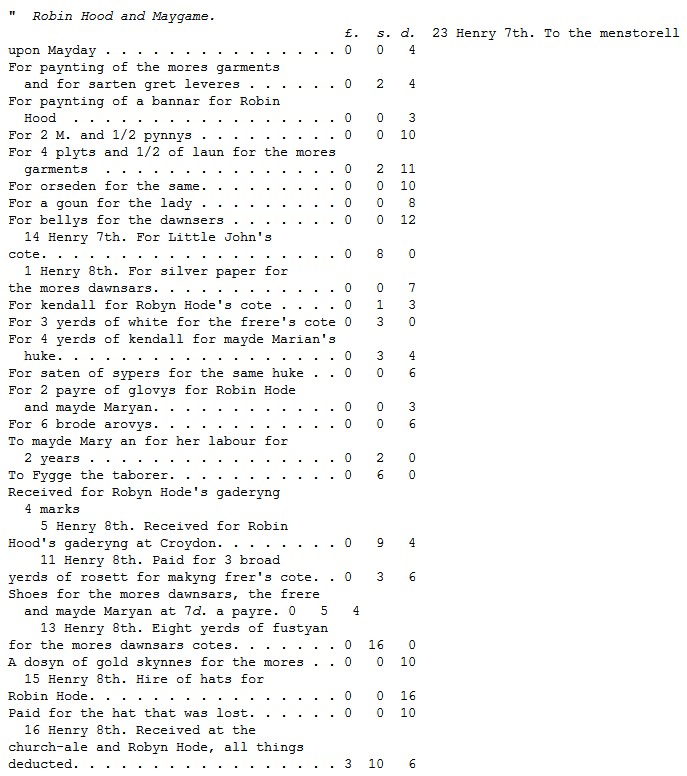
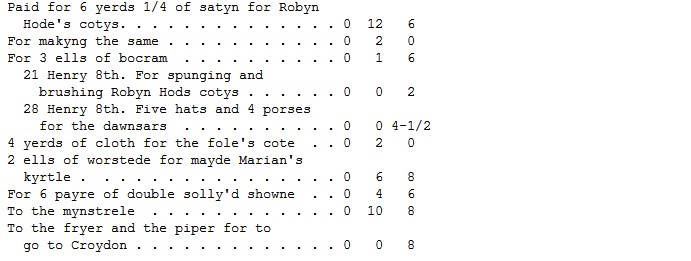
29 Henry 8th. Mem. left in the keeping of the wardens nowe beinge, a fryers cote of russet, and a kyrtle of a worstyde weltyd with red cloth, a mouren's cote of buckram, and 4 morres dawnsars cotes of white fustian spangelyd, and two gryne saten cotes, and a dysardd's cote of cotton, and 6 payre of garters with bells."
Having given so many items of the Robin Hood games, it will not be out of place to furnish some account of the Morrice.
The tabor and pipe strike up a morrice.—A shout within.
A lord, a lord, a lord, who!
ENTER THE MORRICE—They sing.
Skip it, and trip it, nimbly, nimbly,Tickle it, tickle it, lustily,Strike up the tabor, for the wenches favour,Tickle it, tickle it, lustily.Let us be seen on Hygale Greene,To dance for the honour of Holloway,Since we are come hither, let's spare for no leather,To dance for the honour of Holloway.Ed. Well said, my boys, I must have my lord's livery; what is't, a maypole? troth, 'twere a good body for a courtier's impreza, if it had but this life—Frustra storescit. Hold, cousin, hold.
(He gives the fool money.)
Fool. Thanks, cousin, when the lord my father's audit comes, we'll repay you again, your benevolence too, sir.
Mam. What! a lord's son become a beggar!
Fool. Why not, when beggars are become lord's sons. Come, 'tis but a trifle.
Mam. Oh, sir, many a small make a great.
Fool. No, sir, a few great make a many small. Come, my lords, poor and needy hath no law.
Ed. Nor necessity no right. Drum, down with them into the cellar. Rest content, rest content, one bout more, and then away.
Fool. Spoke like a true heart; I kiss thy foot, sweet knight.
(The Morrice sing and dance, and exeunt.)
SWAINE.
THE SELECTOR; AND LITERARY NOTICES OF NEW WORKS
SITTING IN THE DRUID'S CHAIR
We detach the following scene from one of Mr. Horace Smith's Tales of the Early Ages. The date is the fifth century, about twenty years after the final withdrawing of the Romans from Britain. The actors are Hengist, the Saxon chief, Guinessa, his daughter, betrothed to Oscar, a young prince, and Gryffhod, a Briton of some distinction, and proprietor of Caer-Broc, a villa on the Kentish coast, where the parties are sojourning. The incident embodies the superstition of sitting in the Druid's Chair, similar in its portentous moment to sitting in St. Michael's Chair, in Cornwall. It is told with considerable force and picturesque beauty.
"In the morning, Hengist informed his daughter, to her no small dismay, that he meant to take her to Canterbury for the purpose of introducing her to her uncle Horsa, desiring her to make preparations for her immediate departure. 'But before I leave Caer-Broc,' said the Saxon, 'I would fain mount that lofty cliff up which I climbed fifteen years ago, in order that I might discover, if possible, upon what coast the storm had cast me. It commands, as I recollect, an extensive inland view, and I would show my fellow-soldiers the beauty of the country into which I have led them.'
"'It must have been the Druid's Chair, for that is the loftiest headland upon our coast.'
"'The higher the better, my child, for so shall we gain the wider prospect. The morning is at present, clear, and I would climb the cliff before those clouds which I see gathering in the west, shall be blown hither to intercept our prospect.' So saying, he invited his comrades, as well as Oscar, to accompany him; while Gryffhod, on learning his purpose, joined his party with Leoline and others of his men, in order that they might render assistance, should any such be required, in climbing the broken and somewhat perilous ascent to the dizzy summit of the cliff. Ropes were provided in case of accident, as persons had more than once slipped from the narrow ledge, and fallen upon lower fragments of the cliff, whence they could be only extricated by hauling them up.
"Battered and undermined by the storms of ages, the Druid's Chair has long since been shivered into fragments and wasted away; but at the period of which we are writing it formed the outermost of a chain of crags which were connected together by a tongue of rock and cliff sufficiently continuous to allow a passage, but broken into sharp acclivities and descents which rendered the undertaking toilsome to all, and not without peril for those who were liable to be giddy, or who did not possess a good portion of activity. 'Surely,' said Hengist, as he followed Gryffhod, 'this ridge was much more even when I traversed it fifteen years ago.'
"'You are right,' replied the Briton; 'but rains and frosts have since broken away its surface. This is our steepest ascent, but it is the last. We will help Guinessa to surmount it, and when we gain the summit, she shall be the first to sit in the Druid's Chair.'
"With some little mutual assistance, the whole party gained the pinnacle of the cliff, which was a small and nearly circular platform, with a central crag that bore a rude resemblance to a chair. 'You shall have the honour that was promised you,' said the Saxon chief to his daughter; 'but we must first clear away the samphire and weeds which have taken previous possession of your seat.' So saying, he cut them away with his sword, and lead his panting daughter to the throne, upon which she was by no means sorry to rest herself. Hengist then walked repeatedly round the lofty level, pointing out with his weapon the distant objects that engaged his attention, and demanding frequent explanations from Gryffhod, more particularly as to the direction and distance of Canterbury. While he was thus occupied, the heavy western clouds, whose threatenings he had been so anxious to anticipate, were swept rapidly towards them by a sudden storm gust, which lashed up the waves into fury, and instantly surrounded the foot of the crag whirlpools of foam. The extensive prospect upon which they had so lately been gazing was now shrouded in a dense gloom, presently pierced and irradiated by a vivid flash of lightning, followed by a crash of thunder that made the lofty crag tremble beneath their feet. To a martial soul like that of Hengist, this warring of the elements presented a more spirit-stirring and congenial spectacle, than all the tranquil beauties of the previous prospect, and he pointed out to the admiration of his comrades the fiercer features of the scene, shouting with delight as a huge mass of the next projecting cliff, undermined by the raving waters, fell thundering into the depths below.
"While he was thus occupied, either his extended sword was touched, or his arm was unnerved by the electric fluid, for the weapon fell from his hand and instantly disappeared in the whirlpool beneath. 'My sword! my enchanted sword!' exclaimed Hengist with a loud cry of consternation: 'it is lost, it is gone! a hundred pieces of gold to him who recovers my precious weapon! I would plunge after it myself, but that I am prohibited by the magician who fashioned it. My sword! my sword! a hundred horses, besides the gold, to him who finds it. What! my brave comrades,' he continued, casting a reproachful look at his fellow-countrymen, 'will you see your leader ruined, and all his hopes blasted, rather than attempt to get me back my sword?'
"'We came hither to fight the Picts and Scots, not to drown ourselves in such a hopeless enterprise,' muttered the Saxons.
"'Oscar, my intended son-in-law! you are young and vigorous. Show yourself worthy of Guinessa by plunging into the waters in search of my lost talisman.'
"'It is inevitable death; and besides you have promised her to me already,' replied the young Prince, recoiling with a shudder from the edge of the precipice.
"'Craven! recreant! I recall my consent,' shouted Hengist, hoarse with rage, 'and here in the face of Heaven I promise her to him, and him only, who shall redeem my sword from the waters.'
"'Do you swear to that vow?' asked Leoline, starting forward.
"'Ay, I swear by the sword itself, an oath that I dare not violate, even if I would.'
"'Enough?' said Leoline; and springing instantly from the rock, he precipitated himself down the fearful abyss, and plunged into the foaming whirlpool below. Bewildered and aghast at this sudden act of desperation, Guinessa, uttering a scream of agonized terror, would have thrown herself after him, had she not been restrained by Gryffhod; but she still bent over the precipice, her long golden hair, as it streamed upon the wind, together with her white robes and arms, and her fair features, all shown in strong relief against the dark thunder-cloud, imparting to her the appearance of an aerial spirit, just alighted upon this craggy pinnacle to watch the conflict of the elements. Every eye was rivetted upon the spot where Leoline had cleft the eddying waves; not a syllable was uttered; every heart thrilled painfully in expectation of his reappearance, but he rose not again to the surface, and the fears of the gazers responded to those of Guinessa, as she at length ejaculated, in a deep and hollow voice, 'He is lost—he is lost!' Another brief but dreadful pause ensued, when Guinessa, clasping her hands sharply together, exclaimed, with an ecstatic shout, 'He rises—he rises—he has found the sword!' and she sank upon her knees, trembling all over with a vehement and irrepressible agitation.
"The object of her deep emotion was now visible to all, holding the recovered sword in his mouth, while with both hands he fought against the buffetting billows, which hurled him against the foot of the cliff, and as often by their recoil swept him back again; for the wave-worn crag offered no holdfast either for the foot or hand. 'He will perish still; he will be dashed to pieces against the rock,' cried Hengist, almost wild with apprehension.
"'He swims like a fish,' exclaimed Gryffhod, 'but he cannot strike out of that boiling whirlpool; it is too strong for him. The ropes! the ropes! where are they? let us lower them instantly, and we may perhaps succeed in hauling him up.'
"A rope, secured at top to the Druid's Chair, was instantly thrown over, but the lower extremity being blown about by the wind, it was not till after repeated efforts that Leoline could succeed in catching hold of it, when he raised himself out of the water, and began to climb upwards by supporting his feet against the cliff. More than once they slipped away from the wet chalk, and he swung in mid-air; but his teeth still firmly grasped the sword; he soon obtained a drier foothold, and thus climbed to the summit: which he had no sooner reached in safety than Guinessa, overcome by the revulsion of her feelings, sank panting and fainting into her father's arms. Eagerly snatching the redeemed weapon, its owner ran his eye over the blade, when finding that it had received no injury, nor suffered any obliteration of the talismanic characters, he repeatedly kissed it, replaced it in its scabbard, and then cordially embracing its recoverer exclaimed, 'Thanks, brave Leoline; ay, and something more substantial than empty thanks. Guinessa was right, after all; she knows where to find a valiant and a worthy man; and, by Heaven! I am glad that she preferred you to your rival. Right nobly have you won her, and honourably shall you wear the prize. There she is; speak to her; I warrant your voice will revive her more quickly than that of Gryffhod; her consent you need not ask, for that you have obtained already, so take her for your wife when you will, and God give you joy of your choice, as for my part, I thank Heaven for bestowing on me so dauntless a son-in-law!'









